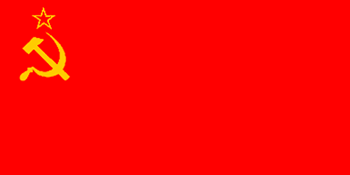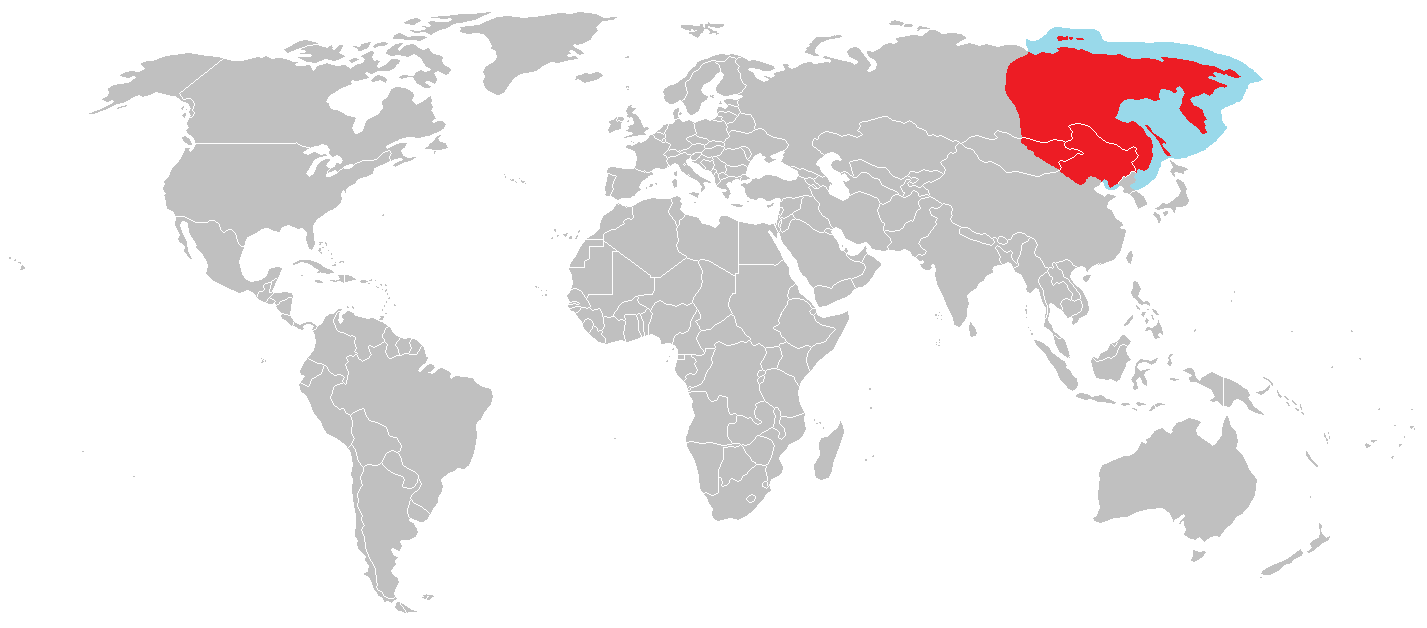Stoklomolvi
| The Communist Dominion of Stoklomolvi | |
|---|---|

| |

| |
| Motto | Only strong governments prevail! |
| Anthem | Canon in D Minor (Orchestral) |
| Region | Listibaldia |
| Official Language(s) | Russian, English, Mandarin |
| Capital - Executive |
Vladistov |
| Government - Commissar - SMPF - Civilian Management - Internal Affairs |
Single Party Communist Government Commissar Alexei Sergeievich Stuyonovich SMPF Head Vasili Vissarionovich Stuyonovich CM Head Grigor Illyanich Stuyonovich IA Manager Boris Nikolaevich Vilstoyvich |
| Population - Mainland |
879,560,214 (October 2007 Census) |
| Establishment - Establishment of Vladistov - Formation of the Stoklomolvi Republic - Formation of the Stoklomolvi Empire - Formation of the Stoklomolvi Monarchy - Formation of the Stoklomolvi Dominion |
4345 B.C.E. 623 B.C.E. 42 C.E. 582 C.E. 1854 C.E. |
| Area - Area - % water |
2,152,240 sq. mi. 27.4% |
| National Colors - Primary - Secondary |
Red (Hex: #FF0000) Yellow (Hex: #FFFF00) |
| GDP - Total (USD) - Per Capita (USD) |
$7,505,649,105,244.37 $8,538.85 |
| Currency | 1 stoklomov = 100 stuyovich coins |
| Military - Army - Air Force - Navy - Anti-Air Defence - Strategic Rocket Forces |
Stoklomolvi Imperial Guard Stoklomolvi Imperial Interceptors Stoklomolvi Imperial Navy Stoklomolvi Imperial Air Defence Stoklomolvi Imperial Weapons Specialists |
| Naval Craft Classification - Military - Civilian |
SINC SCDC |
| Religion | Officially Atheist |
| National sport(s): | badminton, tennis, bowling, golf |
| Internet TLD | .sd (.com.sd, .org.sd, .gov.sd, etc.) |
| Calling Code | +7 |
| Stats: NS NSEconomy NSTracker Sunset XML | |
The Communist Dominion of Stoklomolvi is a nation started many months ago (records show May 2007, but this may or may not be accurate). Stoklomolvi is a relatively large nation that has been stripped bare by uranium mining operations and it is monitored by the Stoklomolvi Military Police Force (SMPF). Its population of 879 million are constantly under strict watch by the government, which measures the country's success by the GDP and commonly refers to the citizens as literal "human resources". As such, all citizens own nothing; they are taxed to the fullest extent of a 100% income tax rate. The government focuses on Defence and Law and Order, with other aspects receiving relatively low or no funding at all.
History
Early History
Stoklomolvi was first "founded" as the tribe of Stelimov, a small duchy that existed from 4233 B.C. in the region near modern-day Manchuria and the Russian Federation. Chieftain Boris Yarsltiv and his followers wandered the region for decades before finally settling near the Yalu River. They dubbed the city Vladistov, after one of the lower chieftain's father, Grigoris Vladimrubin. The fertile river valley served the people well, and they flourished.
Over time, other tribes were consumed by Stoklomolvi, and the region of influence of Stoklomolvi grew large. When the peoples of Stoklomolvi finally made the decision to cross the river, however, they were repelled with a force indescribable for that era. Scores of spearmen and archers charged across the river, only to be forced back by the combined forces of tribes located in modern-day North Korea. Defeated, the men retreated, and they fortified the river in 1218 B.C.E.
Wars were waged in the North as well. Stoklomolvi defeated tribe after tribe until they had reached the Eastern Sea. There, they were able to establish flourishing fishing communities as well as profitable lumber operations. However, due to the rocky soil, only small farms were constructed, and food shortages were common. Peasants grew more disgruntled, and by 712 B.C.E. they knew that the government needed change.
Uneventful years passed, with Stoklomolvi advancing northward and filling in unsettled blocks. Tribes started actively joining Stoklomolvi, and the size of Stoklomolvi grew. Thousands of years seemed to pass without a trace of anything happening. However, a coup was staged, and the despotic government was overthrown. A republic was estabilshed, and the newly-formed Parliament began to form laws.
Soon afterwards, the Republic of Stoklomolvi was stabilised, and nothing happened over the next few hundred years. Eventually, however, barbarian forces from the north-east began to attack Stoklomolvi. The republic began to destabilise as the people began to revolt against the weak government. However, a man named Iosef Nomstoy Stuyonovich rose to power in a coup in 40 C.E.
Stoklomolvi Empire
Iosef was born a peasant, but had eventually learned many of the arts of writing. He gained supporters, and was able to overthrow the Parliament, which was laden with corruption. With the iron block thrown out of the way, Iosef raised a massive army out of the local peasant population. He marched the army northwards, and drove the barbarians away. The barbarians, reaching the large peninsula, were forced into the sea. Iosif soon died in 72 C.E. Stoklomolvi claimed this land as its own, and the empire reached the height of its size. The empire stretched from the Eastern Sea all the way past the modern-day Ural Mountains and even went past the Duchy of Muscovy in 412 C.E.
As the empire grew larger, the leaders began to grow corrupt. He made deals that lined his own pockets. He backstabbed formal allies and forcibly stole their lands. He even killed off members of his own family who disagreed with him. Slowly, the people banded together, and overthrew the despotic government in 512 C.E.
The next in line, Zeitsev, was an incompetent ruler. He did not know how to make decisions, and was tricked by his ministers. As such, he was killed during a riot of peasants in 580 C.E. The man after him was his brother, Pyotr Povtrosky.
Stoklomolvi Monarchy
Pyotr established the Stoklomolvi Monarchy, and a Constitution was drafted. The Stoklomolvi Constitution for a Greater Stoklomolvi was signed by forty-five delegates in 583 C.E. It established a stable federal government, and Pyotr as the king. Two houses, the House of Commons and the House of Lords, were formed. The Commons represented the large peasant population, while the Lords represented the nobility.
The stable monarchy lasted much longer than the empire. Pyotr, a very fair and excellent ruler, was able to rule the people of Stoklomolvi with a just hand. A statue was erected for him in Vladistov, and people from all over Stoklomolvi wrote songs of praise. However, the sad day came when Pyotr passed away in his sleep, and the whole country dressed in red and yellow to mourn the loss of their beloved leader.
Pyotr's son, Farnshev, attempted to follow his father's footsteps. He helped to conduct much research, and the first crossbow was invented in 702 C.E. He tried to stay peaceful, like his father, and he was soon named "The Negotiator". He traveled from parts of the country to the next, and he drove hard bargains. He formed alliances with small neighbouring countries, and conducted much trade. The people slowly learned tu trust Farnshev, and poems were written about him. Farnshev was able to avoid becoming a corrupted despot, and ruled fairly until his death in 772 C.E.
Farnshev had two sons and one daughter. The daughter was married off to a rich nobleman in the north-eastern portion of Stoklomolvi. The two brothers, however, disagreed over many things, including who was the rightful heir. They waged a war, with Neil Stuyonovich controlling the White Army while Karl Stuyonovich controlled the Red Army. Villages were flattened by constant catapult bombardments, and farms were torched by marching troops. Eventually, Neil was shot in the chest during combat. Karl, in sympathy, rushed over to Neil's dying body on his horse. The two brothers reunited for a moment, and Neil passed away in 840 C.E. Karl, deeply saddened, suffered from a stroke soon afterwards and died in 841 C.E.
Karl had but one child named Ivan. Ivan Stuyonovich was awaiting for this moment so that he could stick his grubby hands into Stoklomolvi's national coffers. However, one of his ministers realised his devious plans and attempted to form a coup. Ivan noticed the minister's odd behaviour, and ordered for the Imperial Guard to storm the minister's house. The minister, noticing the odd congregation of troops outside of his farm, quickly rushed and hid in the Stoklomolvi countryside for weeks. Eventually, Ivan forgot about the minister, and started stealing money from the treasury. The national debt soared as Ivan spent millions of stoklomovs on jewelry and gold. The minister, angered by what Ivan was doing to his people, purchased a sword from a local arms dealer. The minister walked calmly to the Imperial Palace, and informed the guards that he was a diplomat. He strode into Ivan's office, gallantly brandishing the sword, and walked up to the king. With a single stroke of his sword, he decapitated the corrupted king in 852 C.E. He climbed through the roof and displayed the head for all to see.
Most cheered; others were saddened that the king had died. However, the country fared much better afterwards. Ivan's only son, Nikolai, became king, and he swore to follow the footsteps of his great-grandfather.
